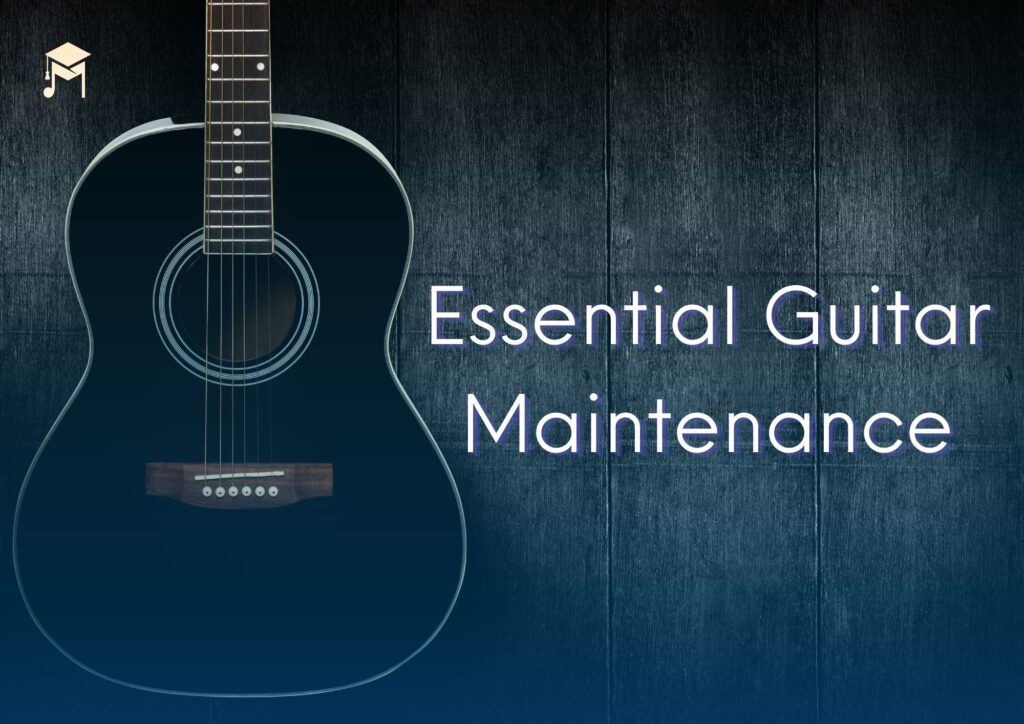Essential Guitar Maintenance | Keep Your Instrument in Top Shape
Maintaining your guitar is crucial not only for keeping it in excellent playing condition but also for ensuring its longevity. Whether you’re a seasoned musician or just starting out, regular upkeep can make a significant difference in your guitar’s performance and lifespan. In this blog, we’ll cover essential guitar maintenance tips to keep your instrument sounding and looking its best.
Why Guitar Maintenance is Important
Guitar maintenance goes beyond just keeping your instrument clean. Regular care helps preserve the tone, playability, and overall condition of your guitar. By dedicating time to maintenance, you prevent long-term damage, extend the life of your guitar, and ensure it stays in top playing condition. Think of it as an investment in the future of your instrument—when well cared for, a guitar can last for decades.

Change Strings Regularly
One of the simplest yet most important maintenance tasks is changing your strings regularly. Over time, strings lose their brightness and elasticity, which affects both tone and playability. Dirt, sweat, and oil from your hands can cause strings to wear out faster. As a general rule, consider changing your strings every few weeks if you play frequently or as soon as you notice dullness in tone. Fresh strings bring back the crispness and vibrancy that make your guitar sing.
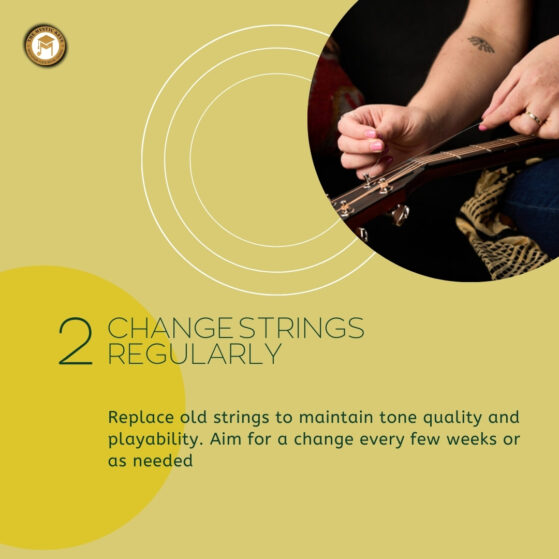
Clean Your Guitar
After each playing session, make it a habit to clean your guitar. Wipe down the strings, fretboard, and body with a soft cloth to remove oils, dirt, and sweat. Over time, grime can accumulate and damage the finish or corrode metal parts like the frets and bridge. You can also use a guitar cleaner for the body and fretboard to give it a deeper clean once in a while. This simple step will keep your guitar looking new and performing at its best.
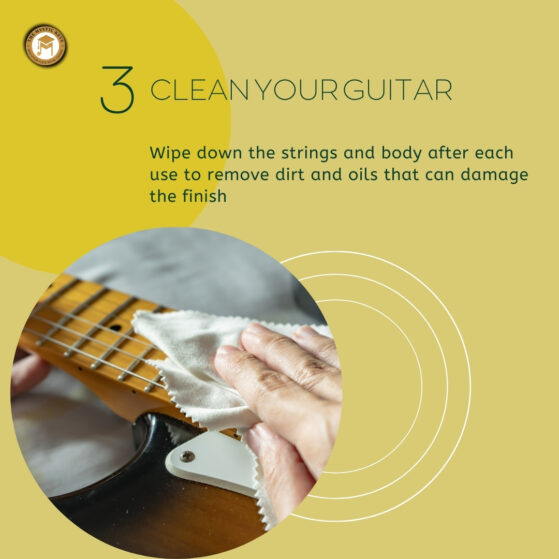
Check the Neck Relief
The neck of your guitar naturally bends slightly under the tension of the strings. This is called “neck relief,” and it affects the action, or the distance between the strings and the fretboard. Too much or too little relief can result in fret buzz or make the guitar difficult to play. Regularly check the neck relief and adjust the truss rod if necessary. If you’re unsure how to adjust the truss rod, consult a professional or refer to your guitar’s manual to avoid damaging the neck.
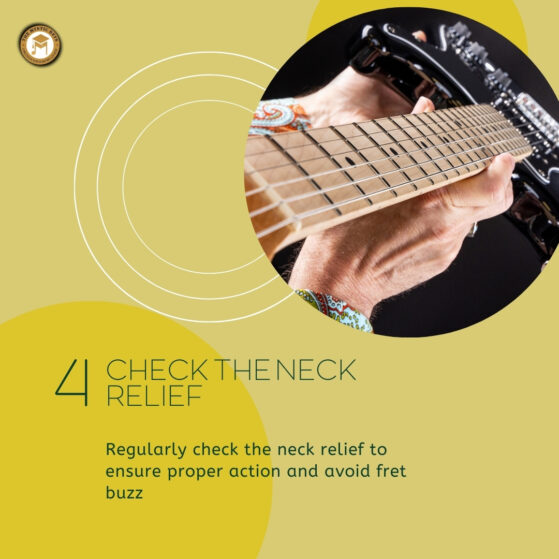
Adjust Intonation
Intonation ensures that your guitar is in tune all the way up the neck. Even if the open strings are perfectly tuned, improper intonation can cause the notes to sound off as you play higher up the fretboard. You can check your guitar’s intonation by comparing the pitch of an open string to the pitch of the same string fretted at the 12th fret. If the two pitches don’t match, the intonation may need adjustment. Most electric guitars have adjustable bridges for this, but acoustic guitars may require professional assistance.

Use a Humidifier
Humidity can have a significant impact on the wood of your guitar, especially acoustic models. In dry conditions, the wood can shrink, leading to cracks, sharp fret ends, and a bowed neck. In overly humid environments, the wood can swell, affecting the sound and playability. To protect your guitar from extreme changes in humidity, especially if you live in an area with dry winters or high humidity summers, consider using a guitar humidifier. This simple tool helps maintain a consistent environment for your instrument.

Store Your Guitar Properly
When you’re not playing your guitar, it’s essential to store it correctly to avoid accidental damage. Always use a sturdy case or a reliable stand to keep it safe from falls or bumps. Leaving your guitar leaning against a wall or on a couch can lead to warping, scratches, or worse, a broken neck. Hard cases offer the best protection, especially for long-term storage or when traveling. If you’re storing your guitar for an extended period, loosen the strings slightly to relieve tension on the neck.
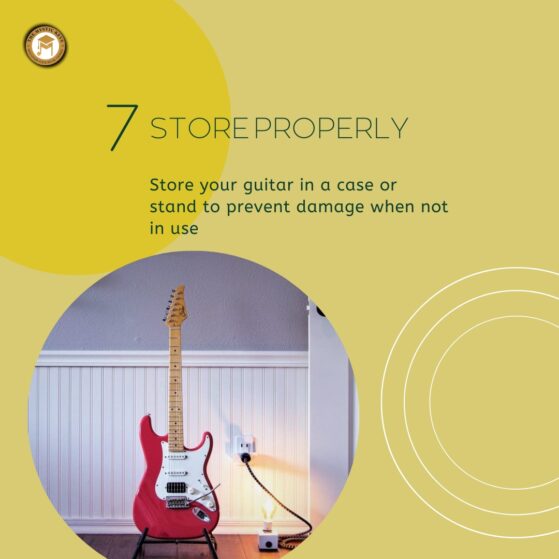
Consult a Professional
Guitar maintenance can seem daunting, but not everything has to be done by yourself. If you’re unsure about certain tasks, such as adjusting the truss rod, changing the action, or setting the intonation, don’t hesitate to take your guitar to a professional. A guitar technician can perform a full setup, ensuring everything is in perfect working order. Regular check-ups with a professional will keep your guitar in excellent condition and save you from costly repairs down the line.

Conclusion
Taking care of your guitar is essential to its longevity and playability. From changing strings and cleaning to checking neck relief and storing it properly, regular maintenance will help your guitar perform at its best. Don’t forget, if you’re ever unsure about anything, consulting a professional is always a good option. With proper care, your guitar can continue to sound great and bring you joy for many years to come. And if you’re looking to elevate your skills, master Guitar from basic to advanced with our Guitar Lessons Online to unlock your full potential.
Happy playing, and remember: a well-maintained guitar is a happy guitar!


